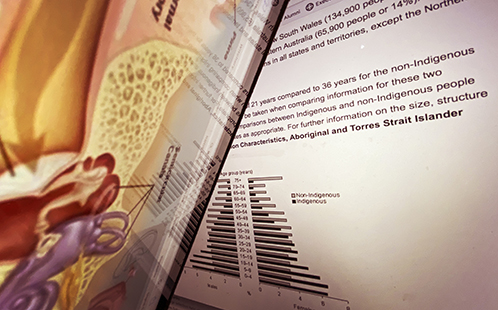
According to new analysis by Western Sydney University and the Australian Bureau of Statistics (ABS), under-reporting of hearing impairment is a substantial issue for the Aboriginal and Torres Strait Islander population.
As part of the 2018–19 National Aboriginal and Torres Strait Islander Health Survey, Aboriginal and Torres Strait Islander people aged seven years and over across Australia participated in a voluntary hearing test. The independent hearing test found more than four in 10 (43 per cent) people had a hearing impairment in at least one ear on the day of testing.
Analysis by the ABS, in partnership with Dr Scott Avery from Western Sydney University's School of Social Sciences, found almost eight in 10 (79 per cent) people with a hearing impairment according to the test did not report having a long-term hearing impairment.
Dr Scott Avery, who is an Indigenous disability researcher and advocate, says both findings are significant as unknown hearing impairments can have wide-ranging and long term impacts on Aboriginal and Torres Strait Islander peoples' lives.
"Our analysis shows Aboriginal and Torres Strait Islander adults with a moderate to profound hearing impairment experience greater inequality in educational, employment and health outcomes compared to those with no hearing impairment," said Dr Avery.
"For example, 41 per cent of people with no hearing impairment had completed Year 12 or equivalent. This was more than double the percentage for people with a moderate, severe or profound hearing impairment (18 per cent). The proportion of people aged 18 to 64 years with no hearing impairment who were employed (57 per cent) was also higher than for people with a moderate, severe or profound impairment (37 per cent)."
According to Dr Avery, providing greater access to hearing services and information is only part of the solution. He believes government policy, including the Closing the Gap strategy, needs to better support the education system to be more inclusive of Aboriginal and Torres Strait Islander children with hearing impairment, along with other types of disability.
"What this data points to is that in say a classroom of 30 Aboriginal or Torres Strait Islander children, about nine will be turning up to class today with a possible hearing impairment, and of that nine, only one will report that they have a long-term hearing impairment," said Dr Avery.
"If you then looked at the educational attainment of this group of nine children with any level of hearing impairment, the likelihood they will go on to complete Year 12 is about two-thirds of the other 21 that have no hearing impairment."






